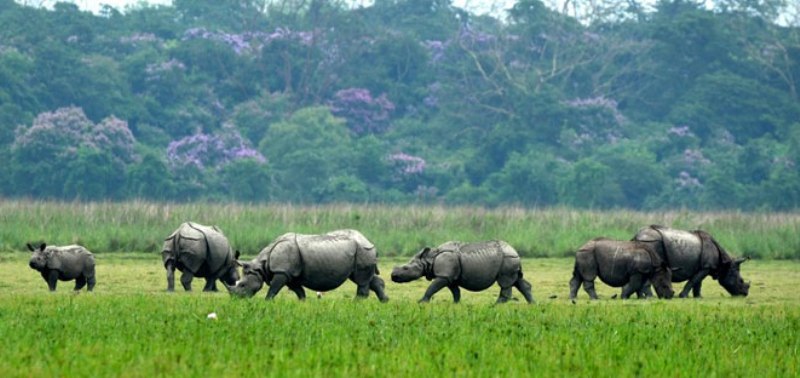Guwahati: A report by a joint committee constituted by the National Green Tribunal has found that several brick kilns have been established within the proposed eco-sensitive zone of Assam‘s Pobitora Wildlife Sanctuary, which is famous for its high density of endangered one-horned rhinos.
The committee, comprising senior central and Assam government officials, was constituted in August this year in response to a 2023 petition filed by environmental activist Utpal Saikia.
In his petition, Saikia accused local authorities of violating Supreme Court directives by permitting industrial activities within a 1-kilometer buffer zone designated for national parks and wildlife sanctuaries.
The committee submitted its report on November 4.
Pobitora Wildlife Sanctuary, located 55 kilometers east of Guwahati, covers 3,880 hectares of rich biodiversity, serving as a critical habitat for species such as one-horned rhinos, wild buffaloes, leopards, and various migratory birds.
The Union Environment Ministry secretary, member secretary of Assam State Pollution Control Board, representative of Central Pollution Control Board and the principal chief conservator of forest (wildlife) Assam are part of the committee. The Central Pollution Control Board was made the nodal agency for the committee for coordination and compliance.
“That site was visited on October 18 by a joint committee, which found a number of brick kilns and other establishments like resorts, hotels etc., located near the periphery of PWS,” stated an order issued by judicial member Justice Sudhir Agarwal and expert member Afroz Ahmad of NGT’s principal bench in New Delhi on November 5.
During the visit to the site, the joint committee found one brick kiln located 892 metres from the boundary of PWS, and two other brick kilns were found set up at 374 metres and 536 metres, respectively from the wildlife sanctuary’s boundary.
In addition, resorts and hotels were found to have been constructed within the proposed ESZ. The committee also found a large resort located around 820 metres from the PWS boundary.
These developments not only pose a serious threat to the natural habitats of wildlife but also disrupt the delicate balance of local ecosystems.
As per a Supreme Court direction in June 2022, all national parks and wildlife sanctuaries falling under protected forests are to earmark a minimum distance of 1km as ESZ and mining and setting of any permanent structures are prohibited within that area.
The committee asked NGT to direct authorities to declare the ESZ of PWS “after rationalisation of the boundary” and the approval of Supreme Court, as the matter is subjudice. It also recommended shifting, closure and regulation of prohibited activities and industries from the ESZ.
The committee recommended increased monitoring of industrial operations near the sanctuary, particularly in relation to pollution control. Regular environmental assessments would ensure that industries comply with pollution standards.
The NGT, based on the committee’s recommendations, decided to implead both Union and Assam ministries of environment, forest and climate change, principal chief conservator of forest (Assam), the state as well as central pollution control boards and the owners of the three brick kilns named in the report, as respondents.
ALSO READ: First integrated check post along India-Bhutan border opened in Assam’s Darranga
The NGT bench directed them to submit responses within two weeks and transferred the original petition in the present case to the eastern zone bench in Kolkata for further proceedings.
The next hearing of the case is listed on December 10.















